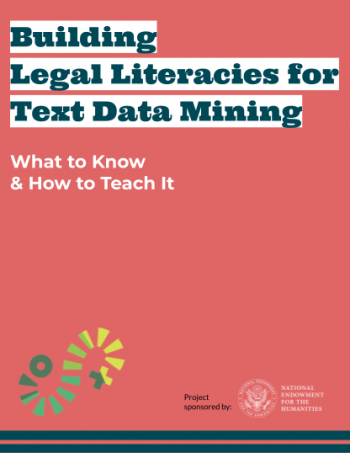Timothy Vollmer, UC-Berkeley Library (CC-BY), Link
Last summer we hosted the Building Legal Literacies for Text Data Mining institute. We welcomed 32 digital humanities researchers and professionals to the weeklong virtual training, with the goal to empower them to confidently navigate law, policy, ethics, and risk within digital humanities text data mining (TDM) projects. Building Legal Literacies for Text Data Mining (Building LLTDM) was made possible through a grant from the National Endowment for the Humanities.
Since the remote institute in June 2020, the participants and project team reconvened in February 2021 to discuss how participants had been thinking about, performing, or supporting TDM in their home institutions and projects with the law and policy literacies in mind.
To maximize the reach and impact of Building LLTDM, we have now published a comprehensive open educational resource (OER) of the contents of the institute. The OER covers copyright (both U.S. and international law), technological protection measures, privacy, and ethical considerations. It also helps other digital humanities professionals and researchers run their own similar institutes by describing in detail how we developed and delivered programming (including our pedagogical reflections and take-aways), and includes ideas for hosting shorter literacy teaching sessions. The resource (available as a web-book or in downloadable formats such as PDF, EPUB, and MOBI) is in the public domain under the CC0 Public Domain Dedication, meaning it can be accessed, reused, and repurposed without restriction.
In addition to the OER, we’ve also published a white paper that describes the institute’s origins and goals, project overview and activities, and reflections and possible follow-on actions.
Thank you to the National Endowment for the Humanities, the project team, institute participants, and staff at the UC Berkeley Library for making Building LLTDM a success.
[Note: this content is cross-posted on the LLTDM blog.]





